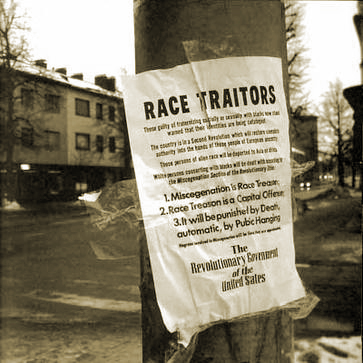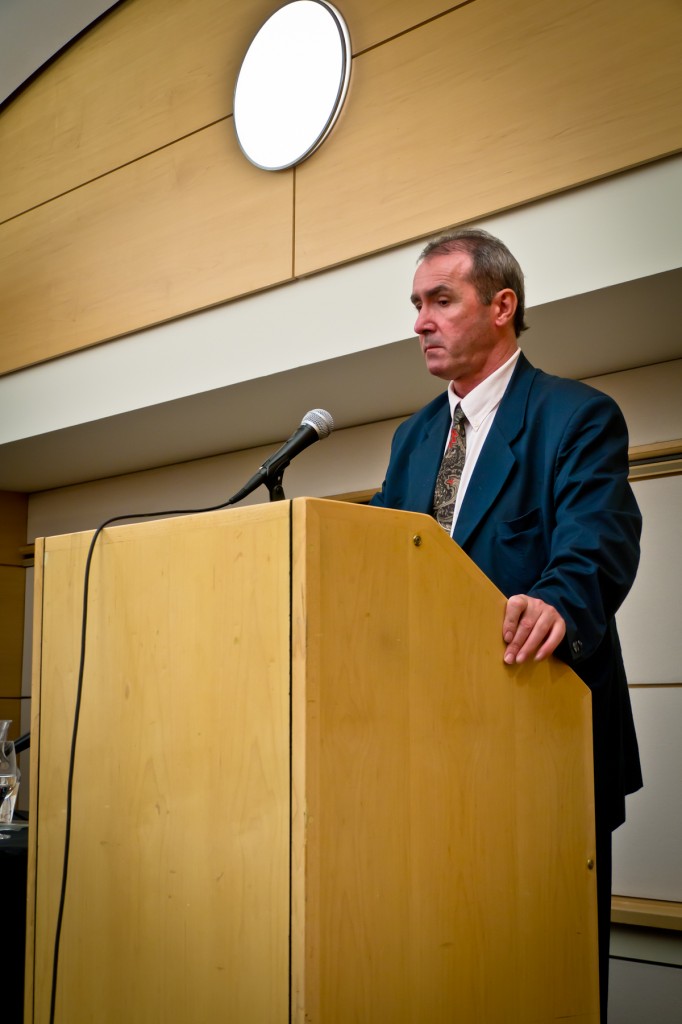
Today has been the Day of the Rope—a grim and bloody day, but an unavoidable one. Tonight, for the first time in weeks, it is quiet and totally peaceful throughout all of southern California. But the night is filled with silent horrors; from tens of thousands of lampposts, power poles, and trees throughout this vast metropolitan area the grisly forms hang.
In the lighted areas one sees them everywhere. Even the street signs at intersections have been pressed into service, and at practically every street corner I passed this evening on my way to HQ there was a dangling corpse, four at every intersection. Hanging from a single overpass only about a mile from here is a group of about thirty, each with an identical placard around its neck bearing the printed legend, “I betrayed my race.” Two or three of that group had been decked out in academic robes before they were strung up, and the whole batch are apparently faculty members from the nearby UCLA campus.
In the areas to which we have not yet restored electrical power the corpses are less visible, but the feeling of horror in the air there is even worse than in the lighted areas. I had to walk through a two-block-long, unlighted residential section between HQ and my living quarters after our unit meeting tonight. In the middle of one of the unlighted blocks I saw what appeared to be a person standing on the sidewalk directly in front of me. As I approached the silent figure, whose features were hidden in the shadow of a large tree overhanging the sidewalk, it remained motionless, blocking my way.
Feeling some apprehension, I slipped my pistol out of its holster. Then, when I was within a dozen feet of the figure, which had been facing away from me, it began turning slowly toward me. There was something indescribably eerie about the movement, and I stopped in my tracks as the figure continued to turn. A slight breeze rustled the foliage overhead, and suddenly a beam of moonlight broke through the leaves and fell directly on the silently turning shape before me.
The first thing I saw in the moonlight was the placard with its legend in large, block letters: “I defiled my race.” Above the placard leered the horribly bloated, purplish face of a young woman, her eyes wide open and bulging, her mouth agape. Finally I could make out the thin, vertical line of rope disappearing into the branches above. Apparently the rope had slipped a bit or the branch to which it was tied had sagged, until the woman’s feet were resting on the pavement, giving the uncanny appearance of a corpse standing upright of its own volition.
I shuddered and quickly went on my way. There are many thousands of hanging female corpses like that in this city tonight, all wearing identical placards around their necks. They are the White women who were married to or living with Blacks, with Jews, or with other non-White males.
There are also a number of men wearing the I-defiled-my-race placard, but the women easily outnumber them seven or eight to one. On the other hand, about ninety per cent of the corpses with the I-betrayed-my-race placards are men, and overall the sexes seem to be roughly balanced.
Those wearing the latter placards are the politicians, the lawyers, the businessmen, the TV newscasters, the newspaper reporters and editors, the judges, the teachers, the school officials, the “civic leaders,” the bureaucrats, the preachers, and all the others who, for reasons of career or status or votes or whatever, helped promote or implement the System’s racial program. The System had already paid them their 30 pieces of silver. Today we paid them.
It started at three o’clock this morning. Yesterday was an especially bad day of rioting, with the Jews using transistorized megaphones to whip up the crowds and egg them into throwing stones and bottles at our troops. They were chanting “racism must go” and “equality forever” and other slogans the Jews had taught them. It reminded me of the mass demonstrations of the Vietnam era. The Jews have a knack for things like that.
But by three o’clock this morning the crowds had long since finished their orgy of violence and chanting and were in bed—all except a few groups of diehards who had rigged up loudspeakers and were blaring System radio broadcasts out over the surrounding neighborhoods, broadcasts which alternated between screaming rock “music” and appeals for “brotherhood.”
Squads of our troops with synchronized watches suddenly appeared in a thousand blocks at once, in fifty different residential neighborhoods, and every squad leader had a long list of names and addresses. The blaring music suddenly stopped and was replaced by the sound of thousands of doors splintering, as booted feet kicked them open.
It was like the Gun Raids of four years ago, only in reverse—and the outcome was both more drastic and more permanent for those raided. One of two things happened to those the troops dragged out onto the streets. If they were non-Whites—and that included all the Jews and everyone who even looked like he had a bit of non-White ancestry—they were shoved into hastily formed columns and started on their no-return march to the canyon in the foothills north of the city. The slightest resistance, any attempt at back talk, or any lagging brought a swift bullet.
The Whites, on the other hand, were, in nearly all cases, hanged on the spot. One of the two types of pre-printed placards was hung on the victim’s chest, his hands were quickly taped behind his back, a rope was thrown over a convenient limb or signpost with the other end knotted around his neck, and he was then hauled clear of the ground with no further ado and left dancing on air while the soldiers went to the next name on their list.
The hangings and the formation of the death columns went on for about ten hours without interruption. When the troops finished their grim work early this afternoon and began returning to their barracks, the Los Angeles area was utterly and completely pacified. The residents of neighborhoods in which we could venture safely only in a tank yesterday were trembling behind closed doors today, afraid even to be seen peering through the crack in drawn drapes. Throughout the morning there was no organized or large-scale opposition to our troops, and by this afternoon even the desire for opposition had evaporated.
I and my men were in the thick of things all day, mostly handling logistics. When the execution squads began running out of rope, we stripped several miles of wire from power poles to use in its place. We also rounded up hundreds of ladders.
And we were the ones who pasted up the proclamations from Revolutionary Command in each block, warning all citizens that henceforth any act of looting, rioting, or sabotage, or any failure to obey the command of a soldier, will result in the summary execution of the offender. The proclamations also carry a similar warning for anyone who knowingly harbors a Jew or other non-White or who willfully provides false information to or withholds information from our police units. Finally, they list the reporting point in each neighborhood to which every person, at a time and date depending upon the position of his name in the alphabet, is to report for registration and assignment to a work unit.
I nearly got into a shooting fight with a company commander near City Hall this morning about nine o’clock. That’s where we were taking all the big shots to be hanged: the well-known politicians, a number of prominent Hollywood actors and actresses, and several TV personalities. If we had strung them up in front of their homes like everyone else, only a few people would have seen them, and we wanted their example to be instructive to a much wider audience. For the same reason many of the priests on our lists were taken to one of three large churches where we had TV crews set up to broadcast their executions. The trouble was that many of the big shots were arriving at City Hall already more dead than alive. The troops on the transport trucks were really giving them a working over.
One famous actress, a notorious race-mixer who had starred in several large-budget, interracial “love” epics, had lost most of her hair, an eye, and several teeth—not to mention all her clothes-before the rope was put around her neck. She was a bruised and bloody mess. I wouldn’t have known who she was if I hadn’t asked. What, I wondered, was the point in publicly hanging her if the public couldn’t recognize her and draw the proper inferences between her former behavior and her punishment?
I was drawn to a commotion near one of the trucks which had just arrived. A grossly fat old man, whom I immediately recognized as the Federal judge who had handed down some of the System’s most outrageous rulings in recent years—including the one confirming the power of arrest granted by the Human Relations Councils to their Black deputies—was resisting the efforts of the troops to pull off his pajamas and dress him in his judicial robe.
One of the soldiers knocked him down, and then four others began kicking him and repeatedly slamming him in the face, stomach, and groin with their rifle butts. He was unconscious, and perhaps already dead, when the rope was knotted around his neck and his limp figure was hauled about halfway up a lamppost. A TV cameraman was recording the whole scene and broadcasting it live.
I was thoroughly disgusted by this latter incident and by several others of a similar nature, and I sought out the officer in charge of the troops there to lodge my complaint. I asked him why he wasn’t maintaining proper discipline among his men, and I told him in strong terms that the beatings of the prisoners were counterproductive.
We must maintain a public image of strength and uncompromising ruthlessness in dealing with the enemies of our race, but to behave like a gang of Ugandans or Puerto Ricans hardly accomplishes that. (Note to the reader: Uganda was a political subdivision of the continent of Africa during the Old Era, when that continent was inhabited by the Negro race. Puerto Rico was the Old Era name of the island of New Carolina. It is occupied now by the descendants of White refugees from radioactive areas of the southeastern United States, but before the race purges in the final days of the Great Revolution it was inhabited by a mongrel race of especially unsavory character.) Above all else we must show ourselves as disciplined, since we will be demanding strict discipline on the part of the civilian population. We must never give vent to our feelings of frustration or our personal hatreds but must show by our behavior at all times that what we are doing is serving a higher purpose.
The captain exploded. He shouted at me to mind my own business. When I insisted that I was minding my business, he became red with anger and said that he, not I, was the one who had the responsibility and that he was doing the best he could under very difficult circumstances.
He pointed out correctly that the Organization had replaced nearly half the men in his company with untrained newcomers in the last month, and so it shouldn’t be surprising to me that discipline wasn’t all it might be. He also told me that he knew enough about the psychology of his men to understand the value of letting them beat the prisoners as a way of justifying to themselves that the prisoners were their enemies and deserved to be hanged.
I really couldn’t counter either of the captain’s arguments, but I did note with some satisfaction that when he turned away from me he strode angrily over to a group of soldiers who were brutally pistol-whipping a long-haired, effeminate-looking youth in an outlandishly “mod” getup— a popular “rock” performer—and ordered them to stop.
Upon thinking about it, I have come to see things more from the captain’s viewpoint.
One other reason for the delay I learned today was that we needed time to finish compiling our arrest lists. For several years Organization members here, just as in other parts of the country, have been building their dossiers of System toadies, Jew-fawners, equalitarian theorists, and other White race criminals, along with their street directories of all non-Whites residing in predominantly White areas. We were able to use the latter, which were kept quite up to date even during the last month, without modification. But the dossiers required a huge amount of evaluation and weeding. In the first place there were far too many of them.
For example, a White family might have a dossier as race criminals because a neighbor had once observed a Black attending a cocktail party at their home or because they displayed one of the “Equality Now” bumper stickers, which have been distributed so widely by the Human Relations Councils. In general, unless there was also other evidence in a particular dossier, these people were not put on the arrest list. Otherwise, we’d have had to hang better than 10 per cent of the White population—an entirely impractical task.
And even if we could hang that many people, there would be no good reason for it; most of that 10 per cent are really no worse than most of the other 90 per cent. They have been brainwashed; they are weak and selfish; they have no sense of racial loyalty—but the same things are true of most people these days. People are what they have become, and we have to accept that—as a starting point.
Actually, it has been true all through history that only small portions of a population are either good or evil. The great bulk are morally neutral—incapable of distinguishing absolute right from absolute wrong—and they take their cue from whoever is on top at the moment.
When good men are the rulers and the program-makers for a society, the population as a whole will reflect this, and people with no originality or moral sense of direction of their own will nevertheless fervently support the highest aims of their society. But when evil men rule, as has been the case in America for many years now, most of the population will wallow happily in degeneracy of the worst kind and will self-righteously parrot every filthy and destructive idea that they have been taught.
Most judges today, most teachers, actors, civic figures, etc., are not being consciously and deliberately evil, or even cynical, in following the lead of the Jews. They think of themselves as being “good citizens,” just as they would think of themselves if they were acting in a diametrically opposite way under the influence of good leaders.
Thus, there is no point in killing them all. This moral weakness will have to be bred out of the race over hundreds of generations. For now it is sufficient for us to eliminate the consciously evil portion of the population—plus a few hundred thousand of our morally crippled “good citizens” across the country, as an example to the rest.
The hanging of a few of the worst race-criminals in every neighborhood in America will help enormously in straightening out the majority of the population and reorienting their thinking. In fact, it will not only help, but it is absolutely necessary. The people require a strong psychological shock to break old habits of thought.
I understand all this, yet I must admit that I was troubled by some of the things I witnessed today.
When the arrests first started the public didn’t realize what was coming, and many citizens were cocky and abusive. I was present shortly before dawn when the soldiers dragged about a dozen young people out of a large house near one of the university campuses, and they, as well as their housemates who were not arrested, were screaming obscenities at our men and spitting on them. All but one of those arrested here were either Jews, Blacks, or mongrels of various sorts, and two of the loudest of them were immediately shot, while the others were herded into a marching column.
The last was a White girl, about 19, a bit flabby but still pretty. The shootings had calmed her down enough so that she was no longer screaming, “Racist pigs!” at the soldiers, but when the preparations for her hanging shortly thereafter awakened her to her own fate, she became hysterical. Informed that she was about to pay the price for defiling her race by living with a Black lover, the girl wailed, “But why me?”
As the rope was knotted around her neck, she blubbered out, “I was only doing what everyone else was. Why are you picking on me? It’s not fair! What about Helen? She was sleeping with him too.” At this last outcry before the girl’s breath was cut off forever, one of the other girls (presumably Helen) in the group of now-silent spectators on the lawn shrank back in terror.
Of course, no one answered the girl’s question, “Why me?” The answer is simply that her name happened to be on our list and Helen’s didn’t. There’s nothing “fair” about that—or unfair either. The girl who was hanged deserved what she got. Helen probably deserves the same fate—and she is undoubtedly suffering the torments of the damned now, in fear that she eventually will be found out and forced to pay the price her friend did.
This little episode has taught me something about political terror. Its very arbitrariness and unpredictability are important aspects of its effectiveness. There are a great many people in Helen’s situation, whose fear that lightning may strike them at any moment will keep them walking on eggs.
The melancholy aspect of the episode is epitomized in the girl’s lament, “I was only doing what everyone else was.” That is a bit of an exaggeration, but it is true enough that had others not set a bad example for her the girl probably would not have become a race-criminal. She paid as much for the sins of others as for her own. Now I realize more than ever before how essential it is that we instill in all our people a new moral basis, a new set of fundamental values, so that they will no longer be morally adrift like that unfortunate girl was—and like the great majority of Americans today are.
This total lack of any healthy or natural morality was brought home to me again just before noon. We were hanging a group of about forty land developers and real estate brokers outside the offices of the Los Angeles County Fair Housing Association. They had all participated in a special program which made lower mortgage rates available for racially mixed families buying homes in predominantly White neighborhoods. One of the realtors was a sturdy, handsome fellow of about thirty-five with a blond crew cut. He was vehemently defending himself: “Hell, I never agreed with any of this race-mixing crap. It makes me sick to my stomach to see these mixed families with their mongrel brats. But a man has to earn a living. I was told by the head building inspector in the county that it would be a lot easier to avoid building-code violations for those realtors who went along with the special mortgage program.”
Without realizing it, he was telling us that a bigger income came before racial loyalty in his set of values—something which is unfortunately true also of a great many who were not hanged today. Well, he made his choice freely, and he hardly deserves any sympathy.
The soldiers didn’t argue with him, of course. When his turn came, he was jerked off his feet with the same impartiality they had shown toward those who had accepted their fate in silence. They were under orders not to argue with anyone or to explain anything, except a brief statement of the offense for which a person was being hanged. Not even the most convincing protestations of innocence or that “there must be some mistake” caused them to hesitate for an instant. Certainly, we must have made some mistakes today—mistaken identities, wrong addresses, false accusations—but once the executions began there was no admitting to the possibility of mistakes. We deliberately created the image of inexorability in the public mind.
And apparently we were quite convincing.
Tomorrow afternoon some of my men will begin organizing civilian labor battalions to cut down the corpses and haul them to the disposal site I have already picked. It’ll probably take three or four days to remove all the bodies—there are between fifty-five and sixty thousand of them—and in this hot weather it’ll be quite unpleasant toward the end.
But what a feeling of relief it is to finally have all the negative part of our task here finished! From now on it’s all uphill—in the good sense: reorganizing, re-educating, and rebuilding this whole society.





